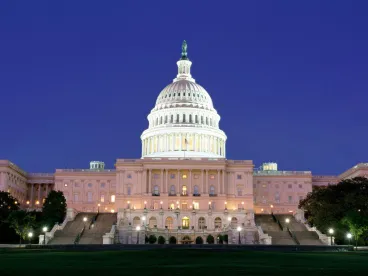On Friday, Jan. 25, 2013, a panel of the D.C. Circuit Court of Appeals issued a groundbreaking decision invalidating the way the recess appointment power of the President has been interpreted for decades. The Court’s decision in Noel Canning v. NLRB, D.C. Circuit Case No. 12-1115, invalidated the recess appointments of three members of the National Labor Relations Board (NLRB) because the Court found that the Senate was not in recess at the time President Obama made the appointments on Jan. 4, 2012.
The Appointments Clause of Article II of the U.S. Constitution allows the President to appoint ambassadors, U.S. Supreme Court Justices, and other “officers of the United States” only with the “advice and consent of the Senate.” In practice, this means that appointees to many judicial, executive, and administrative positions, including the members of the NLRB, must be confirmed by the Senate before they can take office. However, the Constitution allows the President to make appointments without confirmation by the Senate “during the Recess of the Senate.” Going back to the 1940s, Presidential administrations have interpreted this clause as allowing the President to make recess appointments during any break in Senate business of significant duration.
But Friday’s opinion of the D.C. Circuit found that this interpretation of the Recess Appointments Clause is incorrect. Instead, the D.C. Circuit held that the President can only make appointments during “the Recess” of the Senate, which the Court interpreted to mean the time between official sessions of the Senate, as opposed to any significant break during a legislative session. These “Recesses” – i.e. time between official sessions of the Senate – often occur only at the end of the year and for a few number of days, if at all. Accordingly, this interpretation severely limits the opportunities of the President to make recess appointments and allows the Senate to prevent recess appoints from occurring by never officially adjourning sessions of the Senate.
This alone would be a significant departure from current and prior administrations’ interpretation of recess appointments, but the D.C. Circuit added an additional wrinkle by holding not only that the President can only make appointments during official recesses of the Senate, but that these appointments can only be for positions that become vacant during the recess. The prior understanding of the Recess Appointments Clause was that it allowed the President to fill any position that was vacant at the time of the recess, not just those that become vacant during the recess.
Because this decision is such a significant departure from prior understanding of the Recess Appointments clause, it is a virtual certainty that it will be appealed. The NLRB can either request that the D.C. Circuit re-hear the case in front of all of the D.C. Circuit justices (an “en banc” rehearing) or it can appeal the decision directly to the U.S. Supreme Court. The current D.C. Circuit opinion does not go into effect until after these appeal options are exhausted.
If the decision does go into effect, it will have immediate and drastic consequences for the NLRB, which requires a quorum of three validly appointed members to take actions. Because the three recess appointments were not valid, the NLRB did not have a quorum during all of 2012, and continuing into 2013. Accordingly, under the U.S. Supreme Court’s decision in New Process Steel v. NLRB, 130 S. Ct. 2635 (2010), all actions taken by the NLRB during this time are invalid and presumably could be overturned for lack of a proper quorum. Additionally, the NLRB would continue to be unable to take actions until two members are validly appointed by President Obama and confirmed by the Senate, which may take months.
Moreover, while the decision will have direct consequences for the NLRB, it may also have consequences for other recess appointments made by President Obama that would be considered invalid under the D.C. Circuit’s interpretation. For example, Richard Cordray, the head of the Consumer Financial Protection Bureau, was also appointed by President Obama as a recess appointment when he made the NLRB appointments in January of 2012. The D.C. Circuit’s decision, if it goes into effect, will also make drastic changes to the procedure for any recess appointments by the President to any administrative or executive body (not just the NLRB) going-forward.
In response to the court’s decision in Noel Canning, NLRB Chairman Mark Gaston Pearce issued the following statement:
“The Board respectfully disagrees with today’s decision and believes that the President’s position in the matter will ultimately be upheld. It should be noted that this order applies to only one specific case, Noel Canning, and that similar questions have been raised in more than a dozen cases pending in other courts of appeals. In the meantime, the Board has important work to do. The parties who come to us seek and expect careful consideration and resolution of their cases, and for that reason, we will continue to perform our statutory duties and issue decisions.”



 />i
/>i

